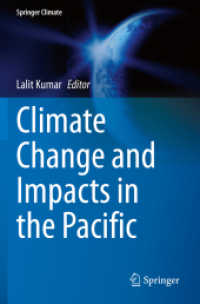- ホーム
- > 洋書
- > 英文書
- > Business / Economics
Full Description
The basic premise of this book is that the conversation on the future of development needs to shift from a focus on poverty to that of inequality. The poverty emphasis is in an intellectual and political cul de sac. It does not address the fundamental question of why people are poor nor what can be done structurally and institutionally to reduce and eliminate it. The various chapters illustrate in the context of various countries and sectors around the world, the significant contributions that evaluators can make in terms of improvement of the analytical framework, analysis of the performance and results of specific programs and projects, as well as assessing and designing better public management systems in terms of poverty and inequality reduction. Beyond the specific contributions presented, three characteristics characterize those evaluations to be relevant for poverty and inequality analysis: a global-local approach: Global to move beyond disciplinary boundaries and consider cross-cutting issues, local to account for the diversity of countries, sectors, institutions and cultures considered; a problem-solving orientation: The issue evaluated is the core focus and determines the choice of evaluation methods to analyze this issue from a variety of angles; an evolutionary approach: Chapters presented are from iconoclasts who do not have any pre-established theory or school of thought to defend. This is the result of openness of mind and ability to adapt the analytical framework, the evaluation methods, and the interpretation of results in a constant interaction with the stakeholders. Such characteristics make evaluation a domain that can help understand better complex issues like poverty, inequality, vulnerability, and their interactions as well as propose a relevant and useful theory of change for public policies and projects to improve the plight of a large part of the world population in industrialized and developing countries alike.







